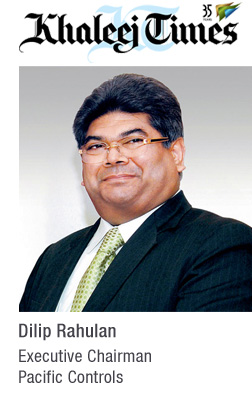
Press Releases
Dilip Rahulan: ‘Our vision stands validated’

“Everything that we can see and use will be connected by the second half of this century,” says Dilip Rahulan, executive chairman of Pacific Controls, in an interview. “Such a network will help create an environment that will facilitate easy, quick and a dynamic decision making process.” Excerpts:
When did you come to Dubai and how difficult was it to start your business?
I came to Dubai in 1996. The process of setting up the business was very organised. We started in 2000 and Pacific Controls witnessed an organic growth in keeping with the opportunities in the market it’s focused on.
Why did you choose Dubai to establish your business and how much has the emirates been a catalyst to the growth story?
The dynamics of real estate sector transformed Dubai though its economic competitiveness as well as sustainable technology in infra-development. Pacific Controls was able to embrace these radical changes and position itself as a smart technology solutions provider to both private and public sector projects.
This has been one of the enablers for our growth with a strong global presence. Innovation lies at the intersection of three core capabilities: Machine and device data platforms; end-to-end managed service delivery for machine-to-machine (M2M); and IT infrastructure integration. Pacific Controls is now the world leader in ICT-enabled services and Internet of Things applications.
What drives you…?
Market dynamics and measures for sustainable development drive me. The challenges of climate change and exponentially growing energy cost have been key factors for continuously keeping with the track of innovation. The smart technologies that facilitate infra-development segment meet the need to improve the quality of life, economic competitiveness and environmental viability.
Do you think leadership can be taught and learned?
Leadership is a human faculty that is developed through the process of knowledge acquisition and experience. Depending upon circumstances and opportunities these faculties transform people to take ownership and deliver phenomenal achievements.
The Emirates Energy Star programme was initiated in partnership with Etisalat. Can you provide us more details of this programme? How much of its set objectives have been realised?
Emirates Energy Star (EES), launched in 2011, is a national level energy efficiency programme, deployed via a unique public-private partnership between Etisalat and Pacific Controls to reduce the carbon footprint in the UAE.
This showcased to the world the commitment we have made to save planet earth from the impact of climate change. UAE will be a pioneer in using ICT-based M2M technology to deliver sustainability under this programme.
EES is currently engaged with over 100 customers representing leading corporates, institutions and public sector entities, which have a combined potential to adopt the programme in more than 100,000 assets across the UAE. It is the fastest growing national level energy efficiency programme in the world, currently enabling thousands of square feet of built-up space to become sustainable in the UAE.
Since November 2011, when Pacific Controls launched EES, the UAE’s National Energy Efficiency Programme has eliminated more than 39,000 tonnes of CO2 emissions till date, which is equal to planting 8,400 trees.
Currently the programme is eliminating an average of 5,000 tonnes of CO2 every month. On average, the programme is reducing electricity consumption of the participating buildings by 19 per cent. The programme, endorsed by UAE’s Ministry of Environment and Water, is well on its way to help make country the smartest in the world, as per the UAE Vision 2021.
What is the most exciting part of your job?
Every day and every moment is an opportunity and never a challenge. The accomplishment of set personal and organisational goals and milestones towards a future vision is exciting. Each accomplishment brings more excitement and pushes the limits of imagination and possibilities even further.
Providing leadership to our teams for pushing boundaries of innovation and creating new products and solutions in software, and delivering it to global companies, is the most exciting part of my job.
What do you rate are amongst the biggest accomplishments of Pacific Controls since its inception?
The validation of our vision to offer technology for sustainable development was symbolised with the construction of Platinum-rated Green Building — the first in the Middle East and 16th in the world. This is one of our biggest achievements. The recognition by the Government of Dubai during the dedication of the building to mandate all other buildings in the Emirate to follow ‘green’ norms was an accomplishment. The structure won two prestigious international awards for the UAE in 2007. PCS also became the first UAE-based technology company to sign as a member of the United Nations Global Compact in June 2007.
How has your management style changed over time and what difficulties did you encounter?
Exponential growth, globalisation and opportunities created by the changing market dynamics helped create a new set of leaders in the organisation. The transformation of Pacific Controls from a systems integrator to being a global leader in software development and managed services company has seen radical changes within the structure.
Do you adjust your management style depending on culture?
We created a unique culture, enabling us to become a global leader in less than five years.
What are the qualities you look out for in your senior managers?
A well-defined and illustrated succession plan is followed across the organisation which stipulates the qualities and qualifications required at all management levels. Specifically at senior manager positions, the core competencies evaluated are corporate vision and implementation, leadership, corporate governance, strategy and management, commitment, calibre, proven track record, resource management and development, discipline and focus. Every senior manager is expected to be the master link between the top management and the lower level employees of the organisation.
What is the most frustrating part of your job?
Frustration is very minimal thanks to a very well structured process and team players in the organisation, though not denying its presence. The effort needed to convince a potential partner is very high and takes considerable effort.
What’s the best advice you’ve ever received?
Don’t give up. This has been my driving force throughout my life. Challenges are everywhere. In a real world situation, the outcomes are not always. If we tend to give up, we will never be able to move forward. Giving up doesn’t enable continuity and help us reach our goals.
Khaleej Times, United Arab Emirtes
Staff reporter (IN CONVERSATION) / 12 April 2014
